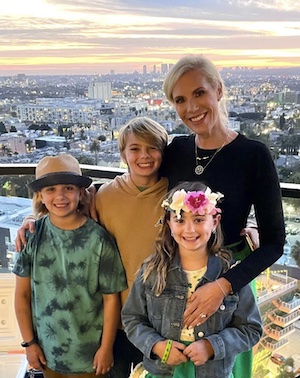By Will Zimmerman
There was never really any question as to what Kristine Lazar was going to study at the University of California, Berkeley, nor what she would do with her degree.
“My family’s nickname for me had been talking box because all I did was talk,” Lazar said. “At some point, someone mentioned to me, ‘You should get paid to talk.’ That’s where the idea of being a reporter came from—as far back as I can remember, that’s what I wanted to be.”
Growing up in San Diego, she has vivid memories of innumerable evenings spent on the couch between her grandparents, the trio devouring the nightly news on their television set. Lazar can still recount many of the names of her local newscasters, their ingratiating voices radiating into the living room. Over and above these newscasters, it was the anchor with NBC News, Deborah Norville, who illustrated to the young blonde girl that a career as a television journalist was not only attainable, but a role she could flourish in.
“A fellow blonde woman who was charismatic and friendly,” Lazar said of Norville, “and always so articulate.” As a naturally outgoing woman herself, a former cheerleader and sorority member, Lazar was often at odds with “the dumb blonde perceptions,” which she says followed her throughout childhood and during the beginning of her professional career. And yet, each evening when Lazar flicked on the television, she saw Norville smiling in direct defiance of those presuppositions.
At Berkeley, where she was inducted into Phi Beta Kappa, Lazar earned a B.A. in Mass Communications because it seemed the most natural segue into the industry. Still, she wasn’t content to confine her studies strictly to the realm of broadcast journalism, nor was she deterred by the fact that there weren’t many students who looked like her in Berkeley’s upper-level classes. In taking advantage of all the liberal arts opportunities the university had to offer, Lazar said she became cognizant of an emphasis on social responsibility that permeated her studies.
It’s been more than two decades since her graduation, but she’s quick to recall a mind theory course that has continued to impact her approach towards interviewing people and reporting their stories. She says that learning about the many ways humans can be manipulated has translated into a responsibility to find and share stories that will foster resilience among vulnerable groups including minorities and elderly populations.
Since 2017, the Emmy award-winning investigative reporter for KCAL News has hosted a franchise called “On Your Side,” which investigates abuse, corruption, and coercion—everything from email phishing to check fraud. This past summer, the segment landed Lazar and her team on the doorstep of a 13-year-old daughter and her mother, the parent having recently received a devastating diagnosis of stage-four cancer.
“[The woman’s] doctors had told her she couldn’t be cured, but that there was a surgery that would extend her life expectancy from months to years, maybe even decades,” Lazar remembered. “Except the insurance company denied her surgery, saying it wasn’t ‘medically necessary.’”
Lazar and her team produced a story that resulted in the doctors at the City of Hope Cancer Center agreeing to perform the surgery out of their compassion fund, meaning the mother wouldn’t have to pay a dime. “This mom essentially was able to get a life-extending surgery and see her daughter, probably into adulthood, because of our shedding light,” Lazar said.
As a mother of three, this story hit especially close to home. “When I became a mom, I started viewing everybody I reported on as someone’s child,” Lazar said, “and I think that compassion shines through in my work.” She knew she wanted a family from a young age—almost as young as when she knew she wanted to be a reporter—and envisioning herself as a working mom wasn’t a stretch because she had grown up watching women like Norville who balanced their family life and career. “When my kids were younger, there was a lot of ‘Mom, why do you have to leave? Don’t go to work,’” Lazar recalled. “But to tell your children, ‘Mommy needs to go to work to help people,’ that’s powerful.”
Working in the second largest television market in the U.S., the stories Lazar and her team report on have the capacity to take on a power of their own. In the case of the story about the mother with the cancer diagnosis, their coverage prompted California’s insurance oversight body to investigate the claim; after reviewing the case, the organization deemed the insurance company was wrong to deny coverage of the mother’s surgery, and the insurer was made to cover the bills. Several months later, Lazar and her team were dispatched to report on a follow-up story: there was a bill moving through the California state legislature aimed at cutting down on prior authorization issues like the mother had experienced.
Following the broadcast of the segment, Lazar said she received countless write-ins from viewers who had their own prior authorization difficulties with insurance companies. “Seeing us highlight an issue that affected [people] so greatly, even when it was too late to help [their loved one] … it was healing for a lot of people,” she said.
There’s a tangible joy in Lazar’s voice as she speaks about affecting change across her state—“If it’s not us, who’s going to advocate for these people?” she asks—and that joy is matched when she recounts the day she received her Phi Beta Kappa honors. “I remember being so proud of that designation,” she says, “and I remember my grandparents being there. They’re no longer with us, but they were so proud to see Phi Beta Kappa next to my name.”
Photo: Kristine Lazar with her children, Lola, Mary (in the hat), and Griffin.
Will Zimmerman graduated from Wake Forest University in May 2023 with an interdisciplinary degree in journalism, film, and creative writing. He was inducted into the Delta of North Carolina chapter several weeks before his graduation.




